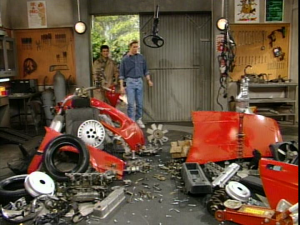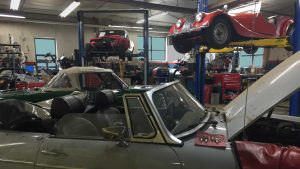Cows walk willingly up the ramp to get that knock on the head. It is wise not to follow their example when it comes to getting your car fixed.
And – it’s not necessary to know a lot about cars to avoid getting that knock on the head… or that great GM feeling.
If you take a few precautions:
* Be sure the guy turning the wrenches is competent –
Deliberate rip-offs are less common than incompetence. Not knowing how to diagnose and troubleshoot problems, especially electrical problems. Which in a modern car is pretty much everything – from the engine to the power windows.
What you want to avoid is a parts puller. The guy who “thinks it might be” this . . . or that. But doesn’t really know.

This is the dude who will “fix” things that don’t need to be fixed while not fixing the thing that does need it. Your car remains perpetually not working while your wallet gets progressively lighter.
So, how do you establish that the guy is competent?
First, know that a fancy-looking credential doesn’t necessarily mean the guy knows his business. It only means he passed a test and got “certified.” Which is fine, but it doesn’t means he’s not a quack anymore than the fact that someone made it through medical school is by definition a competent doctor.
Ask friends for recommendations – word of mouth about a good (and honest) wrench is worth a lot more than a certificate from the ASE, in my book. Ask friends who they avoid. This is worth even more.
Ask whether the wrench will guarantee his work – refund all your money (or not charge you in the first place) if he isn’t able to find and fix the problem. An honest and competent wrench will be glad to offer this assurance. Beware one who will not.
Drive the car before you pay for the car. Make sure it’s fixed. It’s easy to mask a problem – for just long enough to get you a few miles down the road. For example, anyone with an OBD scan tool can temporarily clear codes and turn off the “check engine” light on the dash. But if the problem that triggered the codes and turned on the light hasn’t been fixed, the light will come on again after about 10 minutes of driving.
* For big repairs, get a second opinion –
Unless you have absolute trust in your wrench, get the opinion of another wrench before you commit to a major, high-dollar repair such as replacing the transmission. Sometimes, catastrophic-seeming symptoms mask a a relatively minor issue – once again, especially with modern/computer-controlled vehicles.
I was driving a brand-new Mini Cooper press car a couple of years ago. After doing some shopping, I tried to drive home but the gear shifter (automatic) was locked in Park. If you didn’t know about the emergency manual release that’s under the shifter trim plate, you could be sold a bill of goods about the need for a new transmission. This same car also later would not shift out of first gear. But the transmission wasn’t broken; there was a software glitch that involved no mechanical repairs to the transmission. A small thing – that seemed awfully big (and potentially expensive).
It is critical not to get emotional or panicky when your car acts up. If you do, you may fall victim to fear-mongering and give in to exhortations about the need to get it fixed right now – and right here.
Remain calm. It is not an emergency. Worst case, you will need to rent a car or bum a ride for a little while.
The value of getting a second opinion is two-fold: First, if the second shop confirms the opinion of the first shop as far as the problem is concerned, you can be reasonably confident that the first shop was being honest and competent about what’s actually wrong with the car.
Two, if you get a second estimate, you will have a much better idea as to what constitutes a fair price for the repair. If the second shop’s quote is much higher, you can go back to the first one. Or ask the second shop why their estimate is so much higher than the first shop’s. If the two estimates are about the same, you can feel secure you’re not being taken for a ride.
* Trust (but verify) –
The rheumy old fraud’s formulation is just as applicable to car work as it is to ’80s-era missile treaties.
If, as a for instance, you’ve taken your car in to get the tires rotated, it’s a smart move to discretely mark one of the tires with some white chalk or magic marker or whatever comes to hand, in a place no one would notice unless they knew where to look. Then, when you pick your car up, you can check to see whether the shop actually did rotate your tires.
Similarly, pull the dipstick immediately after an oil change to make sure you got what you paid for – fresh oil. It should be honey-colored and nearly translucent, not brown or (worse) black. If you can, mark the oil filter just as you would the tires – so that you can be certain a new one was actually installed.
You may have read about asking to see olds parts that have been allegedly replaced as evidence the work was actually done. Be aware this can be easily gotten around by the simple expedient of picking up a grimy old part off the shop floor and presenting it to you as “your” old part. The only way to be sure the item came off your car is to mark the part before it gets removed. Then check to see whether the part you’re shown has that mark on it.
* Pre-shop repair shops –
For the same reason it’s good to know something about the doctor who’s about to cut into your chest, it’s a smart move to look for a shop before you need one.
There are excellent dealers and excellent independent shops – and there are also terrible dealers and equally bad independents. Don’t assume that just because it’s “the dealer” that it must be a safe bet. Or that an independent shop isn’t just as good as a dealer because it doesn’t have a Toyota or Ford sign on the door.
Do some drive-bys of the shops you’re thinking about doing business with. Be wary of places where you see the same cars sitting for weeks – or much worse, months – on end. This could indicate a glacially slow work pace or unhappy customers who’ve had to keep bringing their vehicle back for “service.”
Visit the office/waiting area of shop you’re looking over and note whether the employees are friendly – or hostile and sullen.
Cleanliness doesn’t necessarily mean goodness, by the way. It’s a repair shop. You want substance, not superficiality.
*Never accept being taken –
Your final bill should always be within a few dollars of the written estimate you got prior to authorizing repairs – unless you agreed to additional repairs after the original estimate was given to you. In which case the estimate should have been adjusted in writing to reflect this.

Never tolerate a final repair bill that’s significantly (more than about 5 percent) higher than what you were quoted or agreed to. Discuss the cost of the repair with the wrench/shop owner and have everything clearly stated in writing. Including a statement that you do not agree to or authorize repair work/expenses not clearly stated on the estimate.
This ought to cover you.
It is both unethical and illegal to perform repairs not authorized – and to bill you for them.
Do not authorize open-ended repairs – unless you are okay with open-ended bills.
Worst case scenario, you may have to haggle it out in small claims court. But assuming you have a written estimate with the shop owner’s signature, you ought to have no trouble getting both your money and your car back – possibly plus a little extra for the hassle, which the court may well see fit to toss in as a way to teach the shop a lesson.
If you like what you’ve found here, please consider supporting EPautos. (Latest radio guest appearance can be heard here.)
We depend on you to keep the wheels turning!
Our donate button is here.
If you prefer not to use PayPal, our mailing address is:
EPautos
721 Hummingbird Lane SE
Copper Hill, VA 24079
PS: EPautos stickers are free to those who send in $20 or more to support the site. 











“Cows walk willingly…” No they don’t:
https://youtu.be/pVTwf5nhEHI
Competence; conscientiousness; and honesty ALL need to be present in order to have a good mechanic and get a fair deal- and those three traits are extremely hard to find in one package these days.
I wish it were possible to know how many expensive repairs were done/parts replaced, when the real problem was just a bad connection/loose wire/corrosion somewhere, which was inadvertantly fixed when the part was replaced.
I was recently in a discussion with someone who had a c.15 year-old vehicle and who was looking at a $1200 repair job because of an intermittent no-crank problem. The person was actualy on the verge of getting a new car because of this- but after some prodding to do some checking of simple basic things, it turned out the problem was just the ignition switch was out of adjustment- and it cost them NOTHING to fix it.
Was the “$1200” mechanic dishonest? I’d say there’s a good chance he wasn’t. So many of ’em today just rely on trouble codes or flowcharts for diagnostics, that simple obvious things are often just overlooked. And the more so as cars become more and more needlessly complex. If you’re looking for a complex answer, you’re apt to overlook the simple; and plus, there SO MANY wires and connectors and relays and modules, it becomes unfathomable to test them all; to jiggle every single wire; etc. Spend a few huunert bucks in needless part replacement and have the problem inadvertently fixed when the dirty connection to the old part is replaced by the shiny new one on the new part…or spend hundreds of dollars on hours of diagnostics to find the problem….either way, it’s gonna be expensive.
Avoid also Underskull Quackery:
All the pyramid moral schemes you’ve bought into are snake oil.
The code of government of the legendary mythic King Pausole prescribed but two laws for his subjects: the first being, Hurt no man, and the second, Then do as you please.
Pierre Louys, pseudonym of Pierre Louis (1870-1925), was a French novelist and poet who frequented Parnassian and Symbolist circles and was a friend of the composer Claude Debussy.
He founded various literary reviews, notably La Conque in 1891. His Chansons de Bilitis (1894), and Aphrodite (1896), a novel depicting courtesan life in ancient Alexandria, made him a best-selling French writer. You’d do well to learn true laissez faire from him and re-examine all the morality quackery you’ve been force fed.
Eric:
Great article, especially “Don’t assume that just because it’s “the dealer” that it must be a safe bet.”
I worked as an engineer for FCA. One of my tasks was evaluating warranty returns every month. These parts would be sent back their quality engineering center (all for a period of time on a new model, a sampling later).
When I released speakers, I found that the worst ones (the worst actual bad ones) were still perfectly fine more than 78% of the time. Others had a 92% NTF (No Trouble Found) rate.
With automatic transmission shifters, it was > 85% perfectly good shifters replaced.
OEMs pay dealers to replace parts under warranty. They pay 100% parts and labor to the dealer. They require zero proof that the part replaced was actually bad.
I would guess that independent shops get it right more often than dealers just because it’s not “free” money paying the repair.
Just as doctor bills go up when it’s “single payer” or “insurance” covering it – car repair bills go up under warranty for exactly the same reason: I call this the “not my money” phenomenon.
Thanks
I don’t have any auto dealer stories since I never worked for an automaker but dealers for products I have worked on would find ways to do warranty work that wasn’t needed. Then there is the parts replacing idiocy, misdiagnosis etc. But on the other hand they often do identify real problems.
I did some work at an air conditioner manufacturers warranty division for a while many years ago. My job was to bench test compressors that had been returned as defective under warranty. We consistently found the same thing, that about 75% of the compressors were actually fine and shouldn’t have been replaced. There are an awful lot of techs out there who are either dishonest or incompetent. My guess is it’s mostly the latter.
I started working on my cars during the late 1970’s to early 1980s for a slightly different reason. During that time, I lived in the NYC Metro area. At that time, dealerships were crammed full of people and the service department was thin on technicians. Private garages were also expensive and somewhat crooked. If I was going to be able to get any work done on my parents cars, I felt that the best way to do it was to try it myself. So, that I did. I can’t do major repairs, but I have saved a lot of money on a lot of maintenance and repairs that don’t require costly tools to fix.
Back in the 1980’s it was easy to talk to service technicians to find out how a job was done and to peer under the car while they are working. Those “insurance regulations” were not as strictly adhered to as today. That said, I could learn a lot from technicians who could help troubleshoot and repair other problems as well.
With the advent of Youtube and the availability of other online resources, things are a lot easier than they once were.
You tube is a good source, but, you have to beware of those that really do not know what they are doing. I use you tube a lot for many repair videos home/auto/etc.
I sometimes YouTube, too. But always verify before proceeding. Some guys know what they are doing – and have found easier ways to fix things (and fix them right). I always Thumbs Up! the good ones when I find em!
Not being one to go cheap on parts unless I don’t like a vehicle, I went cheap on the Z 71 soon after seeing it needed windshield wipers and needing to adjust one of the washers I had to remove the arms.
I fiddled and faddled and got out various pullers but the damned things were stuck tight. I was looking for a two blade wing puller at the auto parts store and the guy working there asked me what the problem was. I told him the damned wiper arms were stuck and he looked at the pickup and pulled up a YouTube video on it. The guy just pushed down on the arm and them pulled back and it was in his hand. Damn, that looked too easy. So with retaining nut off, I pushed down and pulled back and the thing is in my hand……”tapered” splines, I’ll be damned. I’ll be using the “Change spark plugs and wires” vid when mine come in.
An awesome article Eric! I worked as a mechanic for a short time in the late 1980’s when new home construction tanked here in the Denver, CO area (I was painting very high-end new construction homes at the time). Those 3-4 years nearly ruined my favorite hobby, working on cars (I would suggest if you have a hobby you really like, do some soul searching before turning into a career). I worked for a great shop owner and we only worked on Volvo which were at that time a great car and very mechanic friendly. The owner ran a great business and was very honest. He had a business that was solidly built around 200-300 Volvo owners that took great pride in maintaining their cars & had them serviced and repaired religiously. I am glad I paid attention in automotive school and learned electrical very well, 3 of us tied for top honors in electrical studies. It has paid off many times for me when working on cars or doing repairs on electrical in my home. Eric is spot on when he says these modern cars are very electrically oriented. You must know & understand electrical theory if you want to service the modern auto.
Thank You Eric, this is an awesome site. First time for me posting here.
~Rob Robinson
Thanks, Rob!
Welcome to EPautos!